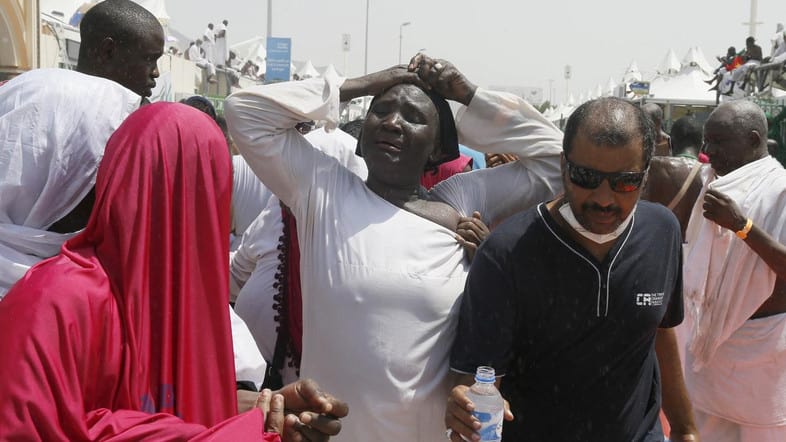UPDATED 9/28/15, 8:15 A.M.EST: As days have passed since the Hajj stampede, the African death toll has increased to more than 200 pilgrims, with even more nations being affected than previously thought.
See the updated list of Hajj stampede deaths below:
- Tunisia, 1
- Nigeria, 54
- Egypt, 55
- Burundi, 1
- Niger, 22
- Burkina Faso, 1
- Morocco, 87
- Kenya, 3
- Cameroon, 21
- Tanzania, 4
- Ivory Coast, 14
- Libya, 4
- Chad, 11
- Senegal, 5
- Somalia, 8
- Algeria, 8
_______________________________________________________________

Muslim pilgrims gather around the victims of a stampede in Mina, Saudi Arabia during the annual hajj pilgrimage on Thursday, Sept. 24, 2015. Hundreds were killed and injured, Saudi authorities said. The crush happened in Mina, a large valley about five kilometers (three miles) from the holy city of Mecca that has been the site of hajj stampedes in years past. (AP Photo)
On Thursday, hundreds perished and nearly a thousand pilgrims were wounded as they participated in the Hajj in Saudi Arabia. According to officials, Kenyans, Nigerians, Egyptians, Nigeriens, and Chadians are among the dead, reports the BBC.
SEE ALSO: James Bond of Ghanaian Journalism Debuts ‘Ghana in the Eyes of God’ Targeting Judges Who Take Bribes
Keep Up With Face2Face Africa On Facebook!
The Hajj is a journey to Mecca and last major rite that every Muslim is encouraged to take at least once in their lives.
On the day of the incident, 2 million pilgrims were fulfilling their religious duties, when a stampede reportedly broke out at an intersection.
With temperatures around 46C [114 degrees farenheit], two massive lines of pilgrims converged on each other at right angles at an intersection close to the five-storey Jamarat Bridge in Mina, a large valley about 5km (3 miles) from Mecca.
This is the deadliest incident to occur during the pilgrimage in 25 years.
So far, 717 people have died and 863 were injured from the incident, with three being identified as Kenyan, two as Nigerian, and eight as Egyptian. Officials are yet to identify the deceased who belong to Niger and Chad.
Nigeria’s Naij.com, though, reports that at least three of its citizens died on Thursday, including professor of Islamic Studies at the University of Maiduguri Tijani El-Miskin (pictured left), journalist as well as the first female editor in northern Nigeria Hajiya Bilkisu Yusuf (pictured), and medical team member Hafsat Shittu.

Many of the victims were from Lagos, Kastina and Borno. “Many Nigerians are involved, I mean those killed and injured,” one of the stampede witnesses [told the press], adding that people were already dehydrated and fainting “before they started tripping all over each other.”
At press time, the Saudi Arabian government is upbraiding pilgrims for the stampede; Health Minister Khaled al-Falih insisted that if pilgrims “had followed instructions, this type of accident could have been avoided.”
But nations, such as Iran (who lost 131 of its citizens to the stampede) and Syria, are criticizing Saudi Arabia for the incident.
There is some strong criticism of Saudi Arabia. Syria’s al-Ba’th blames the government for its “failure” to manage the Hajj properly while Iran’s al-Vefagh quotes an official as saying that Riyadh has shown for years that it is “inadequate” in handling the stone-throwing ritual.
The head of Nigeria’s Hajj delegation and the Emir of Kano, Muhammadu Sanusi II, dismissed Saudi Arabia’s blaming of the pilgrims, saying, “[The stampede] happened on the designated ways for incoming and outgoing pilgrims to the site, [where they were] crossing each other.
“We are therefore urging the Saudi authorities not to apportion blame to the pilgrims for not obeying instructions.”

Mecca resident Fathima Mohamed also said of the stampede, “I was in the crowd and most people… are very peaceful. Then you get the young people and the heat is quite unrelenting. People want to do it quickly, they want to finish everything and because of the fact that it would get hot, people were pushing.”
Watch video of the Hajj Stampede here:
SEE ALSO: Burkina Faso Coup Over, President Kafando Restored to Power











